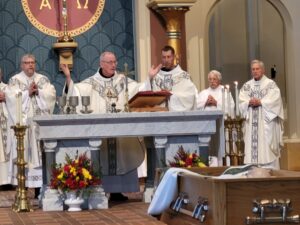
As I said last Post, this week I am sorely tempted to just tell the lovely story of how Saint Thomas came to faith again, and conclude.
However, I think the Apostle Thomas’ desire for the truth naturally leads us to ask some questions about the contemporary search for truth, or lack thereof, and not only in “religious” matters, theology, the Scriptures and so on. When Christ our God said “I am the Way, the Truth and the Life, He meant He is the Truth about all things, for He is the One “through Whom all things were created”. There is no such thing as “the secular world”.
What happens when people (unlike the Apostle Thomas) no longer care what is true or false and just believe “anything”? I’ve watched and warned about this for many years, as I’ve seen this attitude grow. What happens is: Nobody trusts anybody, nobody listens to anybody, and society falls apart. We’re almost there, brothers and sisters. We’re almost there.
I promised in this Post to share “some fairly appalling contemporary examples of what happens when people don’t care about truth”.
But let’s begin long before that. Let me give you my opinion about why things have come to this pass.
The Way We Were
The Ancient One will now speak:
I don’t mean to romanticize the past. There were many problems. I’m not saying change is bad. Since I was young there have been great advances in racial justice and women’s rights, for example, both grounded in our doctrine of Creation. My point is only that in peoples’ concern for what is true, things really were different then. Here are some examples:
“Back in the old days”, say, sixty or seventy years ago (I was there!), we turned on the nightly news on CBS, NBC or ABC *, and all three presented the same news, same facts, each with perhaps a very slightly different slant on them. Newspapers and magazines often had different political approaches, but all agreed on the facts, what was true.
- We had only three national networks, and news reports were only in the evening.
In the many great churches and denominations, despite our differences, all agreed on basic truths: Jesus is the Christ, the Son of God. God is the Holy Trinity. There was no debate about the traditional moral codes. For example, adultery was wrong, sex belonged only in marriage (in those days one didn’t have to specify “heterosexual marriage”), lying and bragging and cheating were despicable, abortion was wrong, and, except for rare anomalies, people were born either male or female and tried to stay that way. * Worship was reverent and “seemly”, according to each church’s tradition. I’m not saying everybody always adhered to these standards, but nevertheless they were the standards.
- I remember when one person in Europe had sex-change surgery it made the news for days on end.
Let’s talk American Politics in the old days. Some of you younger readers may find this hard to believe:
 In 1951 our political parties were so nearly alike that it took a long while for General Dwight Eisenhower to decide whether he would run for President as a Democrat or as a Republican!
In 1951 our political parties were so nearly alike that it took a long while for General Dwight Eisenhower to decide whether he would run for President as a Democrat or as a Republican!
It was assumed that our Presidents would tell the truth. President Eisenhower had denied that we had spy-planes over Russia. When in 1960 it was discovered that he had not been telling the truth about this, the American public was genuinely shocked. Here was another major scandal of the time: It was discovered that President Eisenhower’s Chief of Staff Sherman Adams had accepted a fur coat and a Persian rug (that’s all!) from someone who was doing business with the government. Adams had to resign.
Congress and the Supreme Court were assumed to be honest, and were admired and respected.
There was an unwritten rule that politicians running for the same office would never say a nasty word about each other, and they almost never did. Often they never even referred to each other by name. Political ads and commercials were almost invariably positive, not negative.
Politics was defined as the “art of compromise”. As late as the early 1980s, President Ronald Reagan (a devout conservative) and “Tip” O’Neill (a militant liberal), Speaker of the House of Representatives, were good friends. When they had political differences, they’d sit down together, have a couple of beers and work out a compromise. They went to baseball games together and took their wives to concerts together. (Try to imagine President Biden and ex-President Trump… oh, never mind.)
The Big Change
Today too many American politicians lie to us without shame, and their followers believe or pretend to believe them so they won’t be cast out of their political party.
Various channels present so-called “news” reports so different from each other that we’d never guess they were talking about the same events.
Traditional morality is almost completely up in the air. It’s perfectly acceptable for couples of various sorts to “live in sin”, as we used to call it. (Doesn’t that sound quaint?) Boys want to be girls, and girls want to be boys, and some want to be various other sexes which I must admit I don’t understand. I won’t rattle on about this… I’ll say more about the social/political situation later.
What has caused all this change in society as a whole? I blame the churches.
America’s Founding Fathers believed strongly that “religion” is the foundation of a good society. American religion has lost its moorings. When it forgot about truth and went chasing after I don’t know what…, I think everybody else did, too. So let’s begin there:
The Decline of American Christianity
… in concern for truth, in stability, and in numbers.
As is no secret, churches have changed so much that in many places they are scarcely recognizable to us old-timers.
I’ve been part of this history, so let me speak personally for a few paragraphs.
I grew up in an Evangelical church with its quiet non-intellectual piety, Nineteenth Century hymns, and sermons about giving ourselves to Jesus. (Who was Jesus? Why we should give our hearts to Him? Did they never tell us? or maybe I wasn’t listening?)
You know what today’s Evangelical movement is like: In some places it’s mostly right wing politics, in others worship has transmogrified into entertainment with a pop band up front playing for the people, not for God. Yet others have gone theologically and culturally liberal. I know there are still some classical Evangelical churches around, but they’re not many. What do Evangelicals overall believe is true today? I don’t know.
When I entered Methodist seminary I did not yet believe in the divinity of Jesus. Dr Watson taught us the Creed, and I believed. But I realized that many students who did not believe were going out to preach, so I asked the Dean about it – not to report on them, but just so I could understand. He said those who believed in Jesus could help the church in their way, and whose who did not could help the church in their way. Did he care about the truth? Guess not.
I joined the Episcopal Church because it seemed Anglicans had their mind about them. They believed in the truth of the revelation of God in Jesus Christ, and in the Church He founded. Change was already in the air when I was in Episcopalian seminary in the early 1960s. We had one professor who seemed (it was hard to be sure, because he spoke so cleverly) that Jesus was an interesting First Century teacher. One of my friends attended Noon Mass at Trinity, Wall Street, where a notable Bishop stood up in his fancy regalia and said the doctrine of the Holy Trinity was a bunch of nonsense, and it had to go. Oddly enough he said the Creed and at the end blessed all present in the name of the Trinity!
My friend was aghast, but did this sort of unbelief create a ruckus in the Church? No. A commission of Bishops was formed to look into it, and their conclusion was: There is no such thing as heresy in the modern Church. Did we care about preserving the truth revealed in Jesus Christ, recorded in the Scripture, made clear by the Fathers? Guess not. My home parish, which once was steeped in glorious classical Anglo-Catholic worship and teaching, now has dancing the aisles and… oh, I don’t want to talk about it.

But the biggest abandonment of concern for truth came from the great Roman Catholic Church. The official doctrines remained the same, but…
I remember the “Catholic Church” back in the ’50s: parishes with several priests, multiple Masses on Sundays, many “habited” nuns, and doctrines were enforced, to put mildly. Then, not long after (but contrary to) Vatican II, many things were suddenly turned upside down or (in the case of the Mass) backwards and forwards. Previously unimaginable deviations in worship and doctrine and morals were permitted, without hierarchical correction. At a public panel discussion I heard a Roman Catholic priest deny the divinity of Jesus Christ. An Orthodox friend of mine heard Roman Catholic nuns tell in public how they now worshiped “Geia”, the earth mother. And to cap it all, one day eating meat on Friday was a mortal sin, next day it was not!
In most of the denominations, things were even more extreme. Doctrines that were true sixty years ago were now false or at best only permissible. Behavior that had previously been immoral was becoming acceptable. How were people to know what was true when their leaders no longer knew or seemed to care?
To repeat, I’m not against change, so long as it is grounded in a fuller understanding of Christian doctrine – for example, that God created all human beings, male and female, in His image. But I fear many developments in the churches have been grounded only in “what’s happening now”.
Today the former “mainline” churches (Episcopalian, Methodist, Presbyterian, Baptist) have changed so much (except in real estate), that I fear their people no longer know what to think. I’d guess this is the chief (though not only) reason for their rapid decline in membership. Should the trend continue, these churches will disappear by about the year 2047! (See The Washington Post, April 28 2017.)

Since they no longer trust the established denominations to tell the truth, where have people gone? Many have dropped out entirely. Others have gone “non-denominational”, where each pastor and congregation have teir own truth.
According to Christianity Today , the chief American Evangelical magazine, “Non-denominational” churches now make up the largest segment of American Protestant churches. “These are independent churches [made up of] people who shake off organizational affiliations, disassociate from tradition, and free themselves from established church brands.” Each congregation has its own version of the Gospel, which often changes from pastor to pastor, and if people don’t like the pastor or the Gospel taught here, they just go there where they like it better. It’s called “Cafeteria Christianity”. Cafeteria truth. (See Christianity Today, December 16, 2022)

Other people take an option which requires them only to change channels to find what they want. They are followers of “televangelists”. Each “telepastor” is responsible to no higher authority, entirely free to preach whatever he wants, so long as it brings in enough money to keep his “tele-ministry’ on the air. Their messages range from a variety of Evangelical to completely off-the-wall, such as the “Prosperity Gospel” which teaches that Jesus was wealthy and wants us to get rich, too!
Many of these televangelists may be well-intentioned. However, being adored by so many people “out there”, who are unable to criticize him directly, can easily go to a man’s head. The fact is that more than a few of these guys live in mansions, fly private jets and drive expensive cars. One of my friends (overstating the case, but there’s some truth in it) described the core message of too many of them as “Alleluia. Give your heart to Jesus! Give your money to me!” I was about to show you some video examples of what’s going on out there, but I decided I don’t want that sort of stuff in my Blog. If you wish, search for videos on “Televangelists”. I hope you have a strong stomach.
Christians have long been divided about many things. That was bad enough. But now our divisions go right to the roots: “Your truth is your truth, my truth is my truth. Your Jesus is your Jesus, my Jesus is my Jesus”… ete. etc. and so forth.
If you were, say, a young person searching for the truth of Christianity, seeking something solid to ground your life in… I suspect you’d soon throw up your arms in frustration and give it up.
I’d guess this is the chief reason why the number of Christians overall is also declining rapidly: Fifty years ago 90% of Americans were Christian. (I remember those days.) Today only 64% of Americans say they are Christians. (Pew Research) Brothers and sisters, follow that trend forward for a few more decades.
American Christianity is failing. As I said at the beginning, I think this is the chief reason why in American society as a whole, many people no longer care about facts, about truth.
“When the foundations are destroyed, what can the righteous do?” Psalm 11:3
_____________________________________
This topic which originally was intended for one Post (!) now shows every sign of going on forever. I promise to conclude it…
Next Week: Finally what you’ve waited for all this time: appalling examples of myths, falsehoods, lies that many Americans believe today, seemingly without asking or caring whether they’re true or not. At the end we’ll talk about Saint Thomas and the value of doubt, and how he found the truth… no, how The Truth found him.
Week after Next: I have no idea whatsoever.
As a believer in his 70s and one who wholeheartedly affirms Jesus Christ as our God, and believes in the Trinity of the Nicene Creed; I agree with most all of you keen observations!
But I fear that much of what passes for wisdom and insight these days is (at the very least) a phenomenon to which my own sinful disobedience and indolence has to some extent allowed! What is wrong with the world is a reflection of my own disobedience and lack of repentance. Woe is me. How can taking hold of the oar at this late date have any effect on the course of the ship we all share?
Well, no one of us can ever do much. That has always been true. For some people, all they can do is pray, which counts for a whole lot. However anyone “taking hold of the oar” may inspire someone else to help row. “Light one little candle…”
Hello Fr. Bill. Thanks so much for your insights. This question is off topic, but I was wondering if you know of any weeping icons in America that are currently weeping?
Humbly,
DeAnne